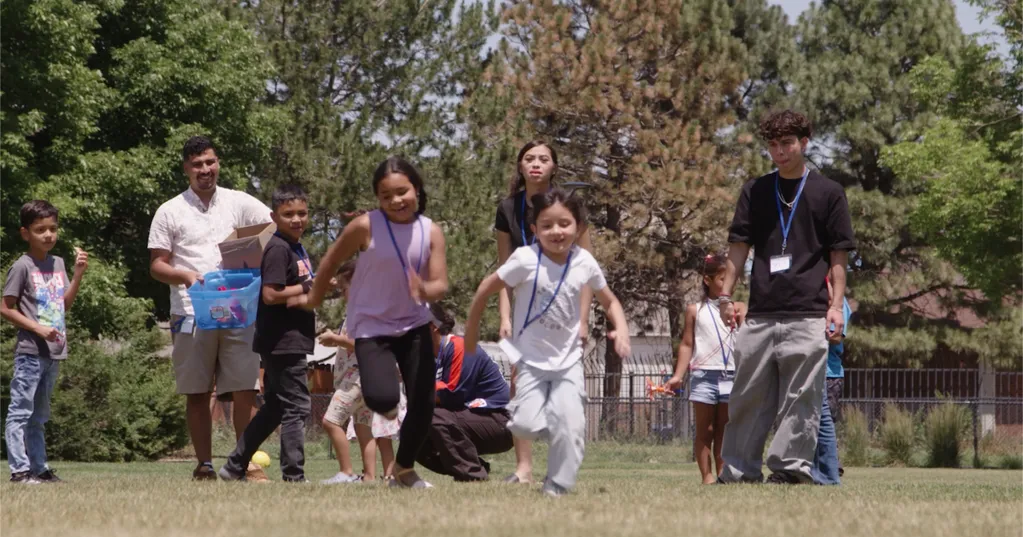Anna Alejo is CBS News Colorado's Executive Producer of Community Impact. She works with the news team to develop more grassroots relationships and original content at the neighborhood and local business level, ensuring a wide range of perspectives are represented in programming.
Caught in the middle of Denver's immigrant population surge -- and the consequent federal government crackdown -- are children.
This summer a group of volunteers came together in Denver to address the students' challenges with both attendance and community.
In 2023 and 2024, according to City of Denver data, 42,911 people arrived in Denver -- migrants from the Southern Border -- leaving places such as Venezuela, Colombia and Central American countries.
Denver Public Schools received 4,759 new migrant students in the 23-24 school year, and 2,319 in the 24-25 school year. Resources were especially strained at the schools receiving the most students.
A nonprofit funded by private donors called TeamUp Colorado put together a summer camp to address chronic absenteeism and to keep young children and their families engaged and connected to learning even as their families say they fear the risk of separation with increased immigration enforcement.
"It is eerie when you go into these complexes and you don't see a soul, nobody, nobody. They're back in there with their doors closed and their blinds pulled," said Jean Boylan, founder of TeamUp Colorado. "We're finding more and more families just do not want to leave their apartments. They're afraid they're going to get deported, and they're deathly afraid that they're going to get separated from their children."
"This past year, we realized that attendance is just a terrible, terrible problem," said Boylan. "We have many, many, many children who are missing 30, 40, 50, 60 days of school."
Boylan worked for months to engage community members and philanthropists to develop a program to support the kids over the summer in hopes of promoting better attendance in the new school year.
"We're really functioning in the here and now. It's like, what do these kids need now? And let's keep moving forward. Let's keep educating them," she said.
"See if we can't get some good understanding of what's going on in their home life and then how to support them. We ended up with this concept that I'm calling a 1950s summer camp, 1950s Iowa summer camp. In the park. On blankets. Hotter than hot. Water coolers and bologna sandwiches. And that's how it started."
Angie, a 17 year old high school student whose family immigrated from Colombia served as a mentor. "I understand English more or less, but I still have trouble with it, so that's why I understand them very well."
"So the concept was to enroll some of the high school kids who could help mentor these kids. They work in workbooks; they do some academic work," said Boylan. "And a couple of people from the community loved that so much that they wrote checks that we were able to give the high school kids stipends."
For Angie though, it wasn’t about the money. She said, “It’s about getting out of my house. Being Latino means practically living locked up in your house. It’s mostly the adults in the family because of the fear of being deported, things like that. They try to keep us from going out.”
Angie said that over the summer she tried to figure out new ways to engage the kids and spark a love of learning.
“I try to understand them; mostly I try to understand them because, for example, I know there are two children who don’t study,” said Angie. “So I try to understand them by not making things so complicated but rather taking things step by step. As if they were starting to study for the first time.”
Jason, who came to the U.S. with his young son from El Salvador, volunteered at the summer camp and made piñatas for a Fourth of July party and then more for each child as a final gift for attending the camp. “Who doesn’t love a star?” he said.
Jason will always make the attempt to speak in English and counsels the high schoolers at the camp to use English whenever possible.
“The United States is the country of dreams. But in truth, it’s not easy here either. If you don’t work hard, you won’t get ahead,” said Jason. He lives with family and recently learned he’d been approved for a work authorization. He and Angie both have pending asylum applications.
Veronica LaCrue, a family liaison for TeamUp Colorado, said, “My philosophy is always, if you don’t know what else to do, take love where it’s needed. These little kids, they’re just precious. They can take a lot of hits, but they should know that somebody loves them and cares about them and doesn’t think of them as throwaways or not important.”
“We understand that we’re on shaky ground; we understand we’re on quicksand. But we want to offer hope anyway. We want people to try anyway. Even if it’s a few weeks that we give them love and they remember that they are important and that they are loved. And that it’s important for them to have education for the future,” added LaCrue.
Volunteers with TeamUp Colorado are hoping to organize more programs this school year, including after-school support.
Denver Public School students return to classes Monday August 18. The district has launched a communications campaign to address chronic absenteeism.
